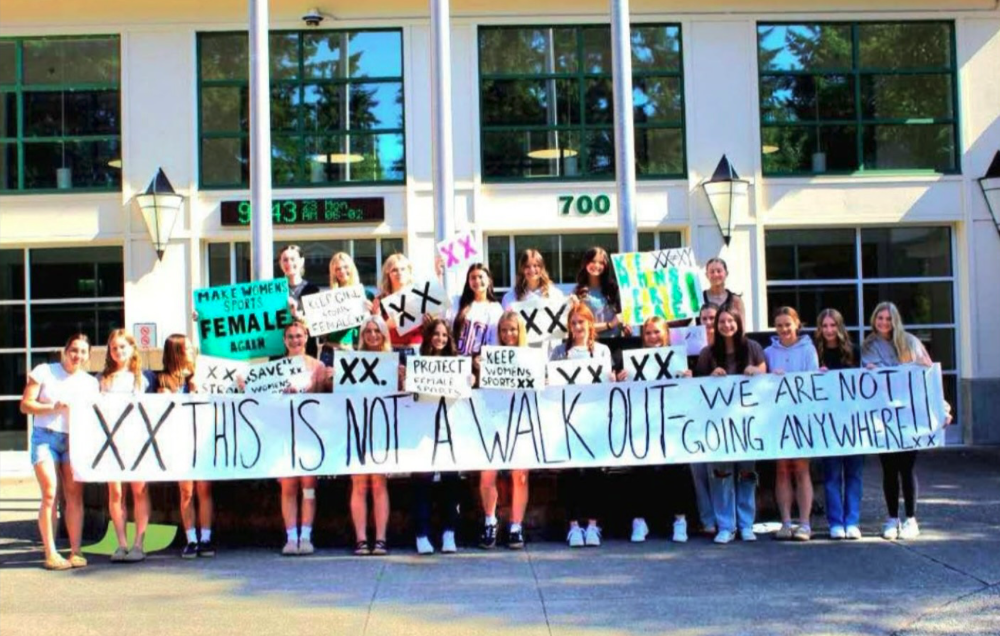An Oregon high school track meet became the center of a national debate when two female athletes refused to share a medal podium with a transgender athlete. The incident at the state championship went viral on social media, starting conversations about fairness in women’s sports. The protest has taken on new importance since the Trump administration began changing federal policies on transgender students in athletics.
The Athlete Podium Protest That Went Viral Over Transgender Participation

At Oregon’s state track and field championship, two high school seniors made headlines with their protest. Alexa Anderson from Tigard High School finished third in the high jump, while Reese Eckard from Sherwood High School placed fourth. When called to the podium with the competitor from Ida B. Wells High School, who placed fifth, both girls stepped down instead. “We stepped off the podium in protest, and the official told us, ‘Hey, go over there, if you’re not going to participate, get out of the photos,'” Anderson said in an interview. The video showed officials telling the protesters to move away so they wouldn’t appear in the championship photos.
Anderson Says It’s About Fairness, Not Hate

Anderson made it clear that her protest wasn’t about disliking anyone, but about keeping women’s sports fair. “I want everyone to know that this isn’t about me or the other girl who stepped down. It’s about the girl in ninth place who should have had a place on that podium,” she told reporters. She believes that when biological males compete against biological females, it creates unfair advantages and takes opportunities away from female athletes. This was her first time competing against a student who was born male but identifies as female. She’d supported similar protests on social media before making her public stand.
State Policy Allows Athletes to Compete by Gender Identity

The Oregon School Activities Association has rules that let “students participate in sports based on their consistently stated gender identity while providing a fair and safe environment for all students.” Peter Weber, the organization’s executive director, recently defended this policy after facing criticism. Weber explained that state law doesn’t allow discrimination based on sexual orientation or gender identity. However, twelve Republican lawmakers have written letters asking for policy changes. A conservative group called the America First Policy Institute filed a complaint against the state in May. The policy was created five years ago with help from the Oregon Department of Education but now faces opposition.
Transgender Participation Divides Female Athlete Community Nationwide

This Pacific Northwest state isn’t alone in facing these challenges. California officials recently told athletes to take off “Protect Girls Sports” T-shirts at meets with similar competitors. Meanwhile, Washington State saw student protests after a transgender female won the girls’ 400-meter title at their state championship. At Tumwater High School, students put up a banner reading “This is not a walkout. We are not going anywhere” to voice their disagreement. Maine and Minnesota witnessed similar incidents during recent state championships. The pattern suggests many female athletes nationwide feel their opportunities to compete fairly are being compromised.
Federal Courts Can’t Agree on the Rules

The legal landscape here gets tricky, with different courts making different decisions. The Fourth Circuit Court of Appeals recently said that discrimination based on gender identity violates federal anti-discrimination law. But this conflicts with laws in many states that restrict who can compete in girls’ sports. More than a dozen female college athletes have sued the NCAA, claiming it violated federal law by allowing a transgender athlete to compete in swimming. The Biden administration delayed making clear rules about sports participation, leaving schools confused about what they should do. Federal courts disagree on how to interpret these laws, so the Supreme Court may need to make the final decision.
Trump’s Order Threatens School Funding

President Trump signed an executive order in February called “No Men In Women’s Sports” that could take away federal money from schools that let transgender girls compete in girls’ sports. The impact was immediate. Four days after Maine’s governor said she’d fight the order in court, federal officials said Maine violated federal anti-discrimination law. State Republicans have introduced new laws that match Trump’s order, while the Department of Justice has started taking action against schools. Educational institutions across the country now worry about losing federal funding if they don’t follow the new requirements. This creates pressure on districts that want to include all students but need federal money to operate.
Read More: Court Rules That Legal Definition of Woman Is Based on Biological Sex
Districts Face an Impossible Choice

Educational institutions are now stuck between conflicting laws that create a no-win situation. What happens when federal and state laws clash? Twenty-three states have laws that restrict sports participation based on biological sex, while states like this one have laws protecting students from discrimination based on gender identity. The state’s School Boards Association says losing federal funding would be devastating for many districts, though legal challenges might delay funding cuts. The association is working with schools on safety measures for future events because these competitions have become tense. Administrators don’t know which laws they should follow since different levels of government are giving them opposite requirements.
What Happens Next Could Change Everything

The future of transgender athlete participation in sports will face new scrutiny as the state’s 2025 legislative session includes several bills about who can play sports. One bill requires that “every sports competition be designated by the biological sex of students who participate.” Legal challenges to Trump’s executive order are expected, which could create even more confusion about what districts must do. The association is keeping its current rules while watching what happens at the federal level, but faces pressure from both sides. The final answer may need to come from the Supreme Court, which could set rules that affect sports participation policies across the entire country for many years. What started with one podium protest has become a turning point in the national debate about fairness and inclusion in sports.
Read More: Trans Athlete Responds to Critics After Back-to-Back Track Titles

